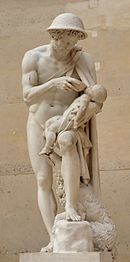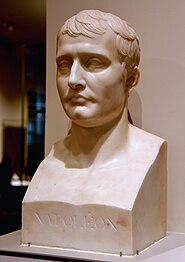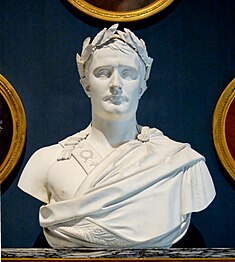Antoine-Denis Chaudet
This article needs additional citations for verification. (October 2022) |

Antoine-Denis Chaudet (3 March 1763 – 19 April 1810) was a French sculptor who worked in the neoclassical style. He was born and died in Paris.[1]
Life and work
He began his artistic training as a student of
Prix-de-Rome. This enabled him to study at the French Academy in Rome
, where he spent four years studying ancient sculpture.
On his return to France in 1789, he was admitted to the
Royal Academy of Painting and Sculpture. In 1801 he took part in illustrating an edition of the collected works of Jean Racine, published by Firmin Didot. Most of these were Biblical scenes. Around that same time, he married one of his students, Jeanne-Elisabeth Gabiou. He also collaborated with Pierre-François-Léonard Fontaine and Charles Percier
on architectural projects.
In 1805, he became a member of the
Institute of France. In February 1810, he took the post of Professor-Rector at the École des Beaux-Arts, replacing Louis-Jean-François Lagrenée, who had died several years before. He died himself, only two months later.[2] He was interred at the Montparnasse Cemetery. The Louvre
holds collections of his sketches and manuscript notes.
In 1812, Napoleon transported Chaudet's marble statue of him to Moscow, to install it in a prominent place there. It is currently on display at the Borodino Panorama Museum.[3]
Notable works
- Peace (Pax, c. 1800 - 1810)
- Emperor Napoleon and Empress Joséphine(exhibited 1811)
- L'Amour (Louvre Museum)
- Joseph Sold Into Slavery by his Brothers (bas-relief, (1784)
- The infant Oedipus and Phorbas (1799). Shown at the Louis Dupaty(1771–1825) after Chaudet's death.
Gallery
-
Cyparissus mourns
his stag -
The poet Homer
-
Cupid catching a butterfly
-
Blind Belisarius, resting
-
Bust of Napoleon
-
Napoleon in porcelain
-
Statue of Napoleon
-
Napoleon as
Julius Caesar -
The goddess Pax
References
- ^ Chappey F., "Les Professeurs de l'École des Beaux-Arts (1794—1873)", In: Romantisme, № 93, 1996, pgs.95—101
- ISBN 5-88737-010-6
Further reading
- Isabelle Lemaistre, et al., Skulptur aus dem Louvre. Sculptures françaises néo-classiques. 1760-1830, (exhibition catalog), Paris, Musée du Louvre, 1990, p. 313
External links
Wikimedia Commons has media related to Antoine-Denis Chaudet.










